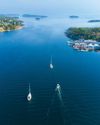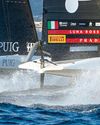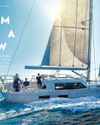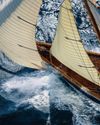Approaching the 35th America’s Cup, Adrian Morgan admires the Great Gamble that won the first event for the Schooner America

On 28 March, 1942, an unusually heavy snowfall smothered the New England countryside. At the height of the blizzard, the roof of a nondescript shed on the waterfront at Trumpy’s Yard in Annapolis collapsed. The incident was scarcely newsworthy: America was at war and had other, far more pressing, matters on its mind. But to historians of the America’s Cup it was a tragedy, for the shed was the final resting place of America, a low, black schooner whose legacy has inspired controversy ever since. Nearly 75 years after one of the world’s most celebrated yachts was crushed beneath tons of corrugated iron and snow, the myth of her invincibility still endures.
America was commissioned by a syndicate headed by Commodore John Cox Stevens of the New York Yacht Club specifically to take up a challenge proffered by Lord Wilton, of Grosvenor Square, London, commodore of the Royal Yacht Squadron, in a letter dated 22 February, 1851, the year of the Great Exhibition.
The price agreed for her building was high – $30,000 – but extraordinary conditions were written into the contract. If she did not prove to be the fastest vessel in the United States the syndicate could refuse her. Moreover, if she were to prove unsuccessful in England, her builders would be obliged to take her back. Stevens, a wealthy man and notorious gambler, was taking no chances – he meant to cover his bets either way.
“News of her informal victory spread like wildfire”
She was a gamble even on the drawing board, her underwater shape influenced by Englishman John Scott Russell’s Wave Line theory, which aimed to produce a hull that offered least resistance to the water, concave bows replacing the rounded bows of the era.
This story is from the December 2016 edition of Yachting World.
Start your 7-day Magzter GOLD free trial to access thousands of curated premium stories, and 9,000+ magazines and newspapers.
Already a subscriber ? Sign In
This story is from the December 2016 edition of Yachting World.
Start your 7-day Magzter GOLD free trial to access thousands of curated premium stories, and 9,000+ magazines and newspapers.
Already a subscriber? Sign In

5 EXPERT TIPS BOB BEGGS ON SAILING IN COLD WEATHER
As temperatures drop, Andy Rice gets tips on how to handle the cold from self-confessed Arctic weather fan and winning Clipper Round the World Race skipper Bob Beggs

SPECIAL REPORT EXTENDED CRUISING IN THE BALTIC
Sweden offers cruisers a warm welcome for winter - Janneke Kuysters has advice on how to boost your sailing time in the region

NIKKI HENDERSON
SEARCHING FOR MORE SPEED? BEFORE TINKERING WITH TINY ADJUSTMENTS, MAKE SURE YOU'VE GOT THE BASICS RIGHT THE POWER DRIVING THE BOAT

MATTHEW SHEAHAN
WHAT WILL THE BOATS OF THE 38TH AMERICA'S CUP LOOK LIKE? THAT'S THE $20 MILLION QUESTION IF BRITAIN OR NEW ZEALAND DECIDE TO DEPART FROM THE AC75

60-knot squalls hit Middle Sea Race
The 45th running of the Mediterranean offshore, the Rolex Middle Sea Race, saw a spectacularly random mix of conditions - even for a race which is famed for its variable weather patterns.

Italy win first Women's Cup
The first ever Women's America's Cup was won by Luna Rossa Prada Pirelli after a single, twoboat shoot-out final on 12 October.

'Three-peat' for ETNZ
As Defender, Emirates Team New Zealand came into this year's 37th America's Cup as clear favourites. But the Kiwi camp has far more than just the structural advantage of being the ones that wrote the Protocol for the competition, and the originators of the AC75 concept.

ROOM WITH A VIEW
SWEDISH DESIGNER GABRIEL HEYMAN POURED A LIFETIME OF IDEAS INTO THIS PILOT SALOON CRUISER, WHICH INCLUDES ARGUABLY THE LARGEST COCKPIT AVAILABLE AT THIS SIZE

LIVING HISTORY
THE ICONIC SEASON-CLOSING REGATTA LES VOILES DE SAINT TROPEZ WAS AN IMMERSIVE HISTORY LESSON FOR CROSBIE LORIMER

CHANGE OF PLAN
LEAVING AUSTRALIA, MARIANNE URTH NEVER PLANNED TO MAKE LANDFALL IN THE ISLANDS OF VANUATU, BUT THE EXPERIENCE WAS MAGICAL